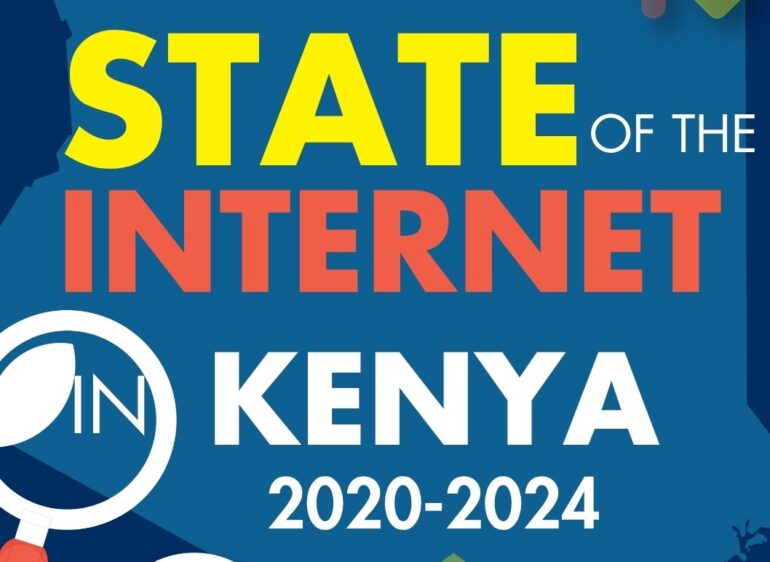A new report by the Bloggers Association of Kenya (BAKE), State of the Internet in Kenya: 2020-2024, reveals that while Kenya has solidified its status as a regional tech leader, its digital progress is being undermined by serious challenges to digital rights.
Between 2020 and 2024, Kenya’s digital landscape experienced a period of remarkable transformation. The nation solidified its position as a regional ICT leader, boasting expanded connectivity, a thriving digital economy, and a blossoming ecosystem of startups and online content creators. However, this progress was not without its drawbacks. The period was also marked by a worrying increase in government overreach, surveillance, and censorship, posing a direct threat to the digital rights and freedoms of Kenyans.
Kenya’s digital economy has been a powerful engine of growth and innovation. The telecommunications sector, led by giants like Safaricom, has driven impressive advancements, with mobile subscriptions soaring to over 71 million and mobile money subscriptions reaching a staggering 42.3 million by the end of 2024. The country’s startup ecosystem has flourished, attracting significant funding and birthing innovative solutions in agriculture, health, and logistics.
Download the State of the Internet in Kenya: 2020-2024 report HERE.
Despite the economic boom, a wave of legislative and state actions has systematically eroded the fundamental freedoms of citizens. Repressive laws like the Computer Misuse and Cybercrimes Act (CMCA) have been weaponized to criminalize online speech, leading to the harassment and arrest of bloggers, journalists and activists. The report documents numerous instances of such violations, including the abduction and even death of bloggers who were critical of political figures.
The government’s use of internet shutdowns and throttling during periods of public dissent, such as the #RejectFinanceBill2024 protests, is a particularly alarming trend that marks a departure from Kenya’s history of relatively open internet access. These actions not only violate the right to freedom of expression but also cause significant economic losses.
“Our report shows a clear paradox in Kenya’s digital landscape. While we’ve made incredible strides in connectivity and innovation, these gains are being overshadowed by a troubling trend of government overreach, surveillance, and repression. The internet should be a tool for empowerment and economic growth, not a weapon against citizens. We are at a crossroads, and urgent reforms are needed to protect digital rights and ensure our progress is both equitable and free.” – James Wamathai, Director, Partnerships & Advocacy, Bloggers Association of Kenya.
The digital economy’s growth has come at a cost to the tech workers who power it. The report highlights the precarious working conditions faced by content moderators, who are often exposed to highly disturbing content without adequate mental health support. The landmark Motaung v Samasource & Meta lawsuit has brought this issue to the forefront, challenging the notion that global tech giants can abdicate responsibility for their outsourced labour.
Similarly, online content creators, a rapidly expanding segment of the digital economy, operate in a legal grey area. They are often misclassified as independent contractors, leaving them vulnerable to exploitative contracts, delayed payments, and a lack of fundamental labour protections. This legal vacuum has also allowed for rampant intellectual property theft and other forms of exploitation. The proliferation of misinformation and disinformation campaigns, often orchestrated by “bloggers for hire,” further complicates this landscape, as it erodes public trust and poses a direct threat to democratic processes.
The “State of the Internet in Kenya: 2020-2024” report reveals a nation at a crossroads. While the country’s digital economy is a source of immense pride and potential, it is built on a foundation that is vulnerable to state overreach and corporate exploitation.
To ensure that Kenya’s digital future is one of freedom, inclusivity, and prosperity, urgent reforms are needed. This includes amending repressive laws, strengthening the independence of regulatory bodies, and enacting robust legal protections for bloggers, content creators, tech workers, journalists, and activists.
Download the State of the Internet in Kenya: 2020-2024 report HERE.
About BAKE
The Bloggers Association of Kenya (BAKE) is a community organization of Kenyan bloggers and content creators that advocates for online content creation, freedom of expression and digital rights in Kenya. Through iFreedoms Kenya, we promote digital rights and media rights in Kenya through archival of important events, research, public interest litigation, policy intervention, advocacy and training.
This report was funded by the European Union, as part of The Kenya Safe and Inclusive Digital Space (KENSAFE) Project. It is a coalition that includes the Bloggers Association of Kenya (BAKE), KICTANet, Internet Without Borders (IWB), Tribeless Youth, Mzalendo Trust, Watoto Watch Network, and Internews Kenya.
The KENSAFE Project aims to foster a democratic, safe, and inclusive digital environment in Kenya by addressing disinformation, misinformation, hate speech, and cyberbullying.
